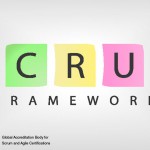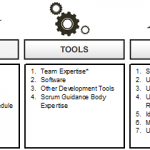What is the basis of the Scrum framework?
Scrum principles are the foundation on which the Scrum framework is based. The principles
of Scrum can be applied to any type of project or organization, and they must be adhered to
in order to ensure appropriate application of Scrum. The aspects and processes of Scrum can
be modified to meet the requirements of the project, or the organization using it, but Scrum
principles are non-negotiable and must be applied as described in the framework presented
in the Scrum Body of Knowledge (SBOKTM). Keeping the principles intact and using them
appropriately instills confidence to the user of the Scrum framework with regard to attaining the
objectives of the project. Principles are considered the core guidelines for applying the Scrum
framework.
Principles, as defined in the Scrum Body of Knowledge (SBOKTM), are applicable to the
following:
• Portfolios, programs, and/or projects in any industry
• Products, services, or any other results to be delivered to stakeholders
• Projects of any size or complexity
Scrum can be applied effectively to any project in any industry—from small projects or teams
with as few as six team members to large, complex projects with up to several hundred team
members.
The Scrum principles are:
Empirical Process Control—with the three main ideas of transparency, inspection, and
adaptation.
Self-organization—This principle focuses on today’s workers, who deliver significantly greater
value when self-organized and this results in better team buy-in and shared ownership; and an
innovative and creative environment which is more conducive for growth.
Collaboration—The third principle of Scrum where product development is a shared value-
creation process that needs all stakeholders working and interacting together to deliver the
greatest value. It also focuses on the core dimensions of collaborative work: awareness,
articulation, and appropriation.
Value-based Prioritizing—The fourth principle of Scrum highlights the Scrum framework’s
drive to deliver maximum business value in a minimum time span.
Time-boxing—The fifth principle of Scrum treats time as a limiting constraint. It also covers the
Sprint, Daily Standup Meeting, and the various other Sprint-related meetings such as the Sprint
Planning Meeting and Sprint Review Meeting, all of which are Time-boxed.
Iterative Development—The sixth principle of Scrum emphasizes that iterative development
helps to better manage changes and build products that satisfy customer needs.






